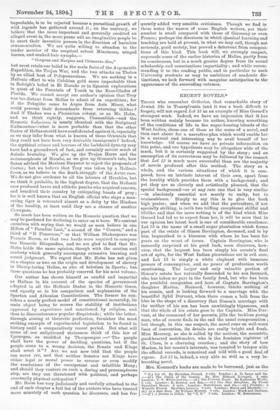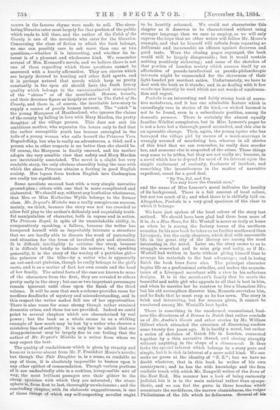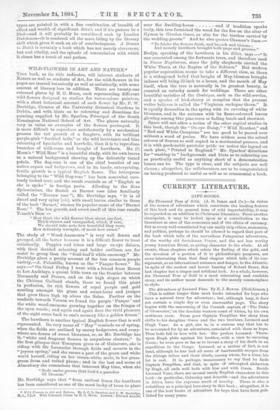RECENT NOVELS.*
THOSE who remember Orthodox, that remarkable story of Jewish life in Transylvania (and it was a book difficult to forget), will not regard Lot 13 as an example of Miss Gerard's strongest work. Indeed, we have an impression that it has been written mainly because its author, knowing something of the conditions of life in the sugar-bearing islands of the West Indies, chose one of them as the scene of a novel, and then cast about for a narrative-plan which would enable her a natural and interesting way to avail herself of her knowledge. Of course we have no private information on this point, and our hypothesis may be altogether wide of the mark, but it is certainly suggested by the story ; and an assumption of its correctness may be followed by the remark that Lot 13 is much more successful than are the majority of novels produced after this method. The story as a whole, and the various situations of which it is com- posed, have an intrinsic interest of their own, apart from the locality which provides them with a background ; and yet they are so cleverly and artistically planned, that the special background—or at any rate one that is very similar —is absolutely essential not merely to unity, but to vraixemblance. Simply to say this is to give the book high praise; and when we add that the portraiture, if not specially striking, is (with two trifling exceptions) skilful and lifelike, and that the mere writing is of the kind which Miss Gerard had led us to expect from her, it will be seen that in our opinion her latest book is one of considerable excellence. Lot 13 is the name of a small sugar plantation which forms part of the estate of Simon Berrington, deceased, and is by him bequeathed to a kinsman with whom he has been for years on the worst of terms. Captain Berrington, who is naturally surprised at his good luck, soon discovers, how- ever, that the bequest has been simply his cousin's final act of spite, for the West Indian plantations are in evil case, and Lot 13 is simply a white elephant with immense powers of consumption, and no power of production worth mentioning. The larger and only valuable portion of Simon's estate has naturally descended to his son Bernard, who has taken no part in the family feud, but who has been the youthful companion and hero of Captain Barrington's daughter Marian. Bernard, however, thinks nothing of his cousin, and is looking forward to a marriage with the beautiful Sybil Darrant, when there comes a 'bolt from the blue in the shape of a discovery that Simon's marriage with the mother of his son has been unwittingly bigamous, and that the whole of his estate goes to the Captain. Miss D ar- rant, at the command of her parents, jilts the luckless young man, who of course finds in the end the usual compensation ; but though, in this one respect, the novel runs on well-worn lines of convention, its details are really bright and fresh. Miss Mercury, as she is called by the natives, the eccentric, good-hearted matchmaker, who is the feminine registrar of St. Clara, is a charming creation ; and the story of bow Marian, in her cousin's interests, was tempted to tamper with the official records, is conceived and told with a good deal of vigour. Lot 13 is, indeed, a very able as well as a very in- teresting novel.
Mrs. Kennard's books are made to be borrowed, just as the ••(1.) Lot 18Catch Dorothea Ourard. 3 vols. London: A'Kennard an and Co. —(2 ) The of the Count. Ey Mrs. Edwaxcl 8 vela. London : F. V. White and Co. (3.) The Princess Ronal. By Katherine Wyldo. 3 vols. London ; K. Bentley and on.—(4.) One Fair Daughter. By Frmult Frankfort Moore. 3 vols. London: Hutchinson and Co.—(S) Fonlia/a : a. Wayside Wizard. By Clara Lemco e. 3 vols. London : Hurst and Blsokett.--- (O.) As a Mah. Sous. By William Westall. 3 vols. London: Ward and Downey. ) A Drama in Dutch. By " Z. Z." 2 vols, London I W. Heinemann. razors in the fatuous rhyme were made to sell. The circu- lating libraries cater most largely for that portion of the public which reads to kill time, and the author of the Catch of the County is one of the novelists who cater for the libraries, Concerning the class of fiction to which the book belong; no one can possibly care to ask more than one or two questions,—whether it is interesting, and whether its in- terest is of a pleasant and wholesome kind. We remember several of Mrs. Kennard's novels, and we believe there is not one of them regarding which these questions cannot be answered with a hearty affirmative. They are stories which are largely devoted to hunting and other field sports, and it is perhaps natural that novels which keep us pretty constantly in the open air should have the fresh breezy quality which belongs to the uncontaminated atmosphere of the " shires " or of the moorland. Horses, hounds, and their devotees figure as largely as ever in The Catch of the County, and there is, of course, the inevitable love-story to supply a centre of purely human interest. The "catch " is the young Marquess of Heatherland, who ignores the claims of the county by falling in love with Mary Mardon, the pretty daughter of the village parson. This does not suit his ambitious mother, who separates the lovers only to find that the rather susceptible youth has become entangled in the toils of a young woman who calls herself the Princess Vera Bogosloffsky, but who is really an adventuress, a thief, and a person who in other respects is no better than she should be. Of course, the Marquess is finally rescued, and his mother adopts the very sensible view that safety and Mary Mardon are inextricably associated. The novel is a slight but very readable story, the only obvious absurdity being the ease with which the sham Princess obtains a footing in good English society. Her lapses from broken English into Oookneyism are really too significant.
Some novelists succeed best with a very simple narrative ground-plan ; others with one that is more complicated and elaborated. We should say, without any hesitation whatsoever, that Mrs. or Miss ICatherine Wylde belongs to the former class. Mr. Bryant's Mistake was a really conspicuous success, mainly, we think, because the story was not too crowded to allow full play to the author's delicately and exquisitely truth- ful manipulation of character, both in repose and in action. The Princess Boyai, in spite of its unmistakable ability, is, comparatively speaking, a failure, because the writer has hampered herself with so improbably intricate a structure that we are hardly able to discern the wood of personality and situation for the trees of involved plot and situation. It is difficult intelligibly to criticise the story, because it is difficult briefly to indicate its nature ; but, speaking generally, it is the story of the wooing of a patrician girl— the princess of the title—by a suitor who is apparently an ont-and-out plebeian, though he really belongs to the girl's caste, and is as a matter of fact her own cousin and the head of her family. The actual facts of the case are known to some of the characters from the first, they are revealed to others pretty early in the story ; but one or two important personages remain ignorant until close upon the finish of the third volume. It will be seen that such a scheme provides room for needless deadlocks of mystery and misunderstanding, and in this respect the writer makes full use of her opportunities. There is also room for some strong though rather strained dramatic crises, and these too'are provided. Indeed we could point to several chapters which are characterised by real power ; but the book as a whole seems to us a striking' example of how much may be lost by a writer who chooses a mistaken line of activity. It is only fair to admit that our disappointment may be largely due to our feeling that the author of Mr. Bryant's Mistdke is a writer from whom we may expect the best.
The quality of readableness which is given by vivacity and humour is never absent from Mr. F. Frankfort Moore's novels; but though One Fair Daughter is, in a sense, as readable as any of them, it is absolutely impossible to bestow upon it any other epithet of commendation. Though various portions of it are undoubtedly able in a reckless, irresponsible sort of way, the most brilliant passages owe their glitter to the cheap cynicism with which they are saturated ; the atmo- sphere is, from first to last, thoroughly unwholesome ; and the concluding chapter, with its elaborate suggestiveness, is one of those things of which any self-respecting novelist ought to be heartily ashamed. We could not characterise this chapter as it deserves to be characterised without using stronger language than we care to employ, so we will only express the hope that no other writer will follow Mr. Moore's example, and that he himself will refrain from repeating so deliberate and inexcusable an offence against decorum and good taste. Were the closing pages expunged, the book would still be largely disagreeable; but it would contain nothing positively sickening ; and some of the sketches of that portion of London society which amuses itself by an affectation of pseudo-intellectual or pseudo-philanthropic interests might be commended for the cleverness of their light. handed yet mordant satire. Unfortunately, we have to deal with the book as it stands ; and in so dealing with it few words can honestly be used which are not words of condemna- tion and regret.
Penhala is an interesting and fairly strong book of narra- tive melodrama, and it has one admirable feature which is exceedingly rare in stories of its kind,—a wicked baronet is not to be found, even in a subordinate position, among its dramatis persona. There is certainly the almost equally familiar Nihilist conspirator, but in Miss Lemore's pages he is not a hero bat a thoroughpaced scoundrel, and this also is an agreeable change. Then, again, the young squire who has betrayed the village girl by means of a mock-marriage is wrongly accused of murdering her, whereas in all stories of this kind that we can remember, be really does murder her, and someone else is suspected of the crime. These things may seem to be trifles, but they are not really so ; because, in a novel which has to depend for most of its interest upon the simple excitement of curiosity, freshness of incident, and something like inventiveness in the matter of narrative expedient, count for a good deal.
"By Tre, Pol, and Pen You may know the Cornish men," and the name of Miss Lemore's novel indicates the locality of its background. There is a fair amount of local colour, but not too much of it; and what there is is skilfully laid on. Altogether, Penhala is a very good specimen of the class to which it belongs.
We have just spoken of the local colour of the story last noticed. We should have been glad had there been more of it in As a Man Sows, for Mr. Westall is never so truly at home as when he is among the factory towns of the northern counties. In his new book be takes us no further northward than Liverpool ; but the early chapters, which deal with mercantile lifo in the great city of the Mersey are among the most interesting in the novel. Later on, the story seems to us to straggle somewhat and to miss grip and unity, as if Mr. Westall had written in haste without giving himself time to arrange his materials to the best advantage ; and in losing finish the book loses force also. The principal character begins life as a professional swin dler, and makes the acquain- tance of a Liverpool merchant with a view to his nefarious designs. It is in the merchant's family that he meets the beautiful and noble girl who appeals to all that is best in him, and when he marries her he resolves to live a blameless life; but his old accomplices discover him, Nemesis overtakes him, and he finds that he must reap as he has sown. The story is brisk and interesting, but for reasons given, it cannot be numbered among Mr. Westall's best books.
There is something in the unadorned, unemotional, busi- ness-like directness of A Drama in Dutch that rather reminds us of Dr. Austin's Guests and other stories by Mr. William Gilbert which attracted the attention of discerning readers some twenty-five years ago. It is hardly a novel, but rather a series of sketches of Dutch life in London, connected together by a thin narrative thread, and closing abruptly without' anything in the shape of a anouement: It thus lacks the special inEerest which belongs to a story pure and simple, but it is rich in interest of a more solid kind. We can make no guess at the identity of " Z. Z."; but we have na doubt whatever, that in this book he writes of his own countrymen ; and he has the wide knowledge and the firm realistic touch with which Mr. Zangwill writes of the Jews of the East End. His manner has a look of being eminently judicial, but it is in the main satirical rather, than sympa. thetic, and we can feel the gusto in those touches which accentuate the sordidness, the narrow clannishness, the vulgar Philistinism of the life which he delineates, Several of his types are painted in with a fine combination of breadth of effect and wealth of significant detail, and if his picture be a libel—and it will probably be considered such by London Dutchmen—it is rendered all the more biting by the literary skill which gives it such an air of convincingness. A Drama in Dutch is certainly a book which has not merely cleverness, but real vitality, and the episode of renunciation with whibh it closes has a touch of real pathos.








































 Previous page
Previous page